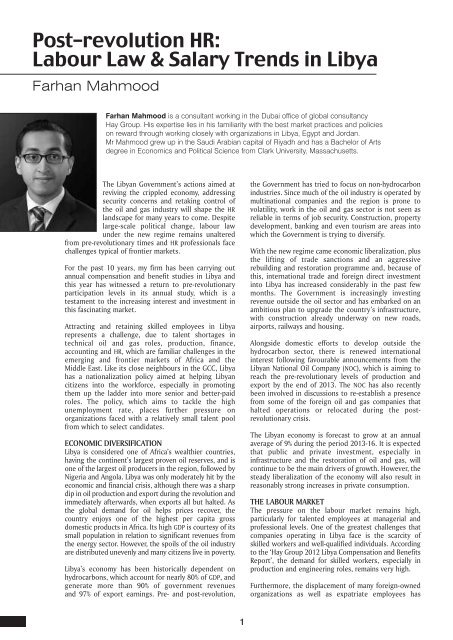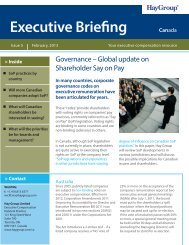Labour Law & Salary Trends in Libya - Hay Group
Labour Law & Salary Trends in Libya - Hay Group
Labour Law & Salary Trends in Libya - Hay Group
Create successful ePaper yourself
Turn your PDF publications into a flip-book with our unique Google optimized e-Paper software.
Post–revolution HR:<br />
<strong>Labour</strong> <strong>Law</strong> & <strong>Salary</strong> <strong>Trends</strong> <strong>in</strong> <strong>Libya</strong><br />
Farhan Mahmood<br />
Farhan Mahmood is a consultant work<strong>in</strong>g <strong>in</strong> the Dubai office of global consultancy<br />
<strong>Hay</strong> <strong>Group</strong>. His expertise lies <strong>in</strong> his familiarity with the best market practices and policies<br />
on reward through work<strong>in</strong>g closely with organizations <strong>in</strong> <strong>Libya</strong>, Egypt and Jordan.<br />
Mr Mahmood grew up <strong>in</strong> the Saudi Arabian capital of Riyadh and has a Bachelor of Arts<br />
degree <strong>in</strong> Economics and Political Science from Clark University, Massachusetts.<br />
The <strong>Libya</strong>n Government’s actions aimed at<br />
reviv<strong>in</strong>g the crippled economy, address<strong>in</strong>g<br />
security concerns and retak<strong>in</strong>g control of<br />
the oil and gas <strong>in</strong>dustry will shape the HR<br />
landscape for many years to come. Despite<br />
large-scale political change, labour law<br />
under the new regime rema<strong>in</strong>s unaltered<br />
from pre-revolutionary times and HR professionals face<br />
challenges typical of frontier markets.<br />
For the past 10 years, my firm has been carry<strong>in</strong>g out<br />
annual compensation and benefit studies <strong>in</strong> <strong>Libya</strong> and<br />
this year has witnessed a return to pre-revolutionary<br />
participation levels <strong>in</strong> its annual study, which is a<br />
testament to the <strong>in</strong>creas<strong>in</strong>g <strong>in</strong>terest and <strong>in</strong>vestment <strong>in</strong><br />
this fasc<strong>in</strong>at<strong>in</strong>g market.<br />
Attract<strong>in</strong>g and reta<strong>in</strong><strong>in</strong>g skilled employees <strong>in</strong> <strong>Libya</strong><br />
represents a challenge, due to talent shortages <strong>in</strong><br />
technical oil and gas roles, production, f<strong>in</strong>ance,<br />
account<strong>in</strong>g and HR, which are familiar challenges <strong>in</strong> the<br />
emerg<strong>in</strong>g and frontier markets of Africa and the<br />
Middle East. Like its close neighbours <strong>in</strong> the GCC, <strong>Libya</strong><br />
has a nationalization policy aimed at help<strong>in</strong>g <strong>Libya</strong>n<br />
citizens <strong>in</strong>to the workforce, especially <strong>in</strong> promot<strong>in</strong>g<br />
them up the ladder <strong>in</strong>to more senior and better-paid<br />
roles. The policy, which aims to tackle the high<br />
unemployment rate, places further pressure on<br />
organizations faced with a relatively small talent pool<br />
from which to select candidates.<br />
ECONOMIC DIVERSIFICATION<br />
<strong>Libya</strong> is considered one of Africa’s wealthier countries,<br />
hav<strong>in</strong>g the cont<strong>in</strong>ent’s largest proven oil reserves, and is<br />
one of the largest oil producers <strong>in</strong> the region, followed by<br />
Nigeria and Angola. <strong>Libya</strong> was only moderately hit by the<br />
economic and f<strong>in</strong>ancial crisis, although there was a sharp<br />
dip <strong>in</strong> oil production and export dur<strong>in</strong>g the revolution and<br />
immediately afterwards, when exports all but halted. As<br />
the global demand for oil helps prices recover, the<br />
country enjoys one of the highest per capita gross<br />
domestic products <strong>in</strong> Africa. Its high GDP is courtesy of its<br />
small population <strong>in</strong> relation to significant revenues from<br />
the energy sector. However, the spoils of the oil <strong>in</strong>dustry<br />
are distributed unevenly and many citizens live <strong>in</strong> poverty.<br />
<strong>Libya</strong>’s economy has been historically dependent on<br />
hydrocarbons, which account for nearly 80% of GDP, and<br />
generate more than 90% of government revenues<br />
and 97% of export earn<strong>in</strong>gs. Pre- and post-revolution,<br />
the Government has tried to focus on non-hydrocarbon<br />
<strong>in</strong>dustries. S<strong>in</strong>ce much of the oil <strong>in</strong>dustry is operated by<br />
mult<strong>in</strong>ational companies and the region is prone to<br />
volatility, work <strong>in</strong> the oil and gas sector is not seen as<br />
reliable <strong>in</strong> terms of job security. Construction, property<br />
development, bank<strong>in</strong>g and even tourism are areas <strong>in</strong>to<br />
which the Government is try<strong>in</strong>g to diversify.<br />
With the new regime came economic liberalization, plus<br />
the lift<strong>in</strong>g of trade sanctions and an aggressive<br />
rebuild<strong>in</strong>g and restoration programme and, because of<br />
this, <strong>in</strong>ternational trade and foreign direct <strong>in</strong>vestment<br />
<strong>in</strong>to <strong>Libya</strong> has <strong>in</strong>creased considerably <strong>in</strong> the past few<br />
months. The Government is <strong>in</strong>creas<strong>in</strong>gly <strong>in</strong>vest<strong>in</strong>g<br />
revenue outside the oil sector and has embarked on an<br />
ambitious plan to upgrade the country’s <strong>in</strong>frastructure,<br />
with construction already underway on new roads,<br />
airports, railways and hous<strong>in</strong>g.<br />
Alongside domestic efforts to develop outside the<br />
hydrocarbon sector, there is renewed <strong>in</strong>ternational<br />
<strong>in</strong>terest follow<strong>in</strong>g favourable announcements from the<br />
<strong>Libya</strong>n National Oil Company (NOC), which is aim<strong>in</strong>g to<br />
reach the pre-revolutionary levels of production and<br />
export by the end of 2013. The NOC has also recently<br />
been <strong>in</strong>volved <strong>in</strong> discussions to re-establish a presence<br />
from some of the foreign oil and gas companies that<br />
halted operations or relocated dur<strong>in</strong>g the postrevolutionary<br />
crisis.<br />
The <strong>Libya</strong>n economy is forecast to grow at an annual<br />
average of 9% dur<strong>in</strong>g the period 2013-16. It is expected<br />
that public and private <strong>in</strong>vestment, especially <strong>in</strong><br />
<strong>in</strong>frastructure and the restoration of oil and gas, will<br />
cont<strong>in</strong>ue to be the ma<strong>in</strong> drivers of growth. However, the<br />
steady liberalization of the economy will also result <strong>in</strong><br />
reasonably strong <strong>in</strong>creases <strong>in</strong> private consumption.<br />
THE LABOUR MARKET<br />
The pressure on the labour market rema<strong>in</strong>s high,<br />
particularly for talented employees at managerial and<br />
professional levels. One of the greatest challenges that<br />
companies operat<strong>in</strong>g <strong>in</strong> <strong>Libya</strong> face is the scarcity of<br />
skilled workers and well-qualified <strong>in</strong>dividuals. Accord<strong>in</strong>g<br />
to the ‘<strong>Hay</strong> <strong>Group</strong> 2012 <strong>Libya</strong> Compensation and Benefits<br />
Report’, the demand for skilled workers, especially <strong>in</strong><br />
production and eng<strong>in</strong>eer<strong>in</strong>g roles, rema<strong>in</strong>s very high.<br />
Furthermore, the displacement of many foreign-owned<br />
organizations as well as expatriate employees has<br />
1

















